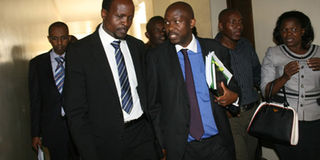Evidence ‘cooked’ in Obado petition

Mr Okoth Obado (left) with lawyer Okong’o Omogeni on April 3, 2014 after the Supreme Court stopped the electoral commission from declaring his seat as vacant. The IEBC has accused the Court of Appeal of creating its own evidence in arriving at a decision to nullify the election of Mr Okoth Obado as Migori Governor. PHOTO | WILLIAM OERI
What you need to know:
- The Independent Electoral and Boundaries Commission (IEBC) told the Supreme Court, through lawyer Victor Obondi that “the judges manufactured their own evidence which was not pleaded by the petitioner, Prof Edward Akong’o Oyugi.”
- Mr Obondi told the seven-judge bench that the judgement was very dangerous and “if allowed to stand, no elections will ever be held in Kenya”.
- The lawyer said that no elections were devoid of errors anywhere in the world, and Kenya was not an exception.
The electoral commission has accused the Court of Appeal of creating its own evidence in arriving at a decision to nullify the election of Mr Okoth Obado as Governor Migori.
The Independent Electoral and Boundaries Commission (IEBC) told the Supreme Court, through lawyer Victor Obondi that “the judges manufactured their own evidence which was not pleaded by the petitioner, Prof Edward Akong’o Oyugi.”
Mr Obondi told the seven-judge bench that the judgement was very dangerous and “if allowed to stand, no elections will ever be held in Kenya”.
The lawyer said that no elections were devoid of errors anywhere in the world, and Kenya was not an exception.
“The judges gave an ex parte (one party) judgement and did not analyse the rival submissions by IEBC, which answered the issues raised by Prof Oyugi,” Mr Obondi stated.
The lawyer said the judgement of Mr Justice Onyango, Mr Justice Sankale ole Kantai and Mr Justice William Ouko has not substance but “a misrepresentation of the High Court record.”
“I urge this court to correct the misapplication of the law by the court of appeal as it set a bad precedent, which cannot be followed in future,” Mr Obondi pleaded during the hearing, which continues Tuesday.
He said the appellate court analysed the facts of the case and came up with its own figures from the scrutiny and recount ordered by Lady Justice E. N. Maina who heard the main petition at the Homa Bay High Court.
He urged the judges to allow the appeal by Mr Obado and declare him validly elected.
Chief Justice Dr WillyMutunga, the deputy CJ Lady Justice Kalpana Rawal, Justice Philip Tunoi, Mr Justice Mohammed Ibrhim , Mr Justice Jackton Ojwang , Ladu Justice Njoki Ndung’u and Mr Justice Smokin Wanjala to allow the appeal by Mr Obado and declare that he was validly elected as Migor Governor during the March 4 2013 general poll.
The judges were also urged by lawyers Ahmednassir Abdullahi and Okong’o Omogen for Mr Obado to set aside the appellate judgement since “ the three judges failed to address issues of law and fact.”
“The appeal judges analysed the facts instead of looking into the law thereby setting a bad precedent,” Mr Abdullahi urged.
Mr Omogeni urged the judges to strike out an two new affidavits by Prof Oyugi and Mrs Ann Anyang which introduced new facts that were not pleaded both at the High court and Court of appeal.
Mr Obado was declared the winner after garnering 123,821 votes against Prof Oyugi’s 123,653. The difference was only 163 votes but after scrutiny and recount the margin increased to 577.
“The scrutiny and recount solidified the victory of Mr Obado. I urge this court to allow the appeal and set aside the entire court of appeal judgement,” Mr Abdullahi urged the seven judges.
The hearing continues Tuesday.





